Datasheet
Year, pagecount:2014, 4 page(s)
Language:English
Downloads:4
Uploaded:March 11, 2019
Size:526 KB
Institution:
-
Comments:
Attachment:-
Download in PDF:Please log in!
Comments
No comments yet. You can be the first!Content extract
Source: http://www.doksinet Global Business – 2014 – Ranim Helwani Chapter 8 – The Future of the Transnational – An evolving global role à With expansion of MNEs more and more the question comes up about what responsibilities comw with the power that they have accumulated. à MNEs have advanced the progress of many large nation-‐states as their economic and social infrastructure benefited from the value created through cross-‐border trade and investment. à However, MNEs do not have lifted all boats; in the poorest countries it appeared only to be lifting the already
rich à unequal distribution of benefits à In the poorest countries, the reputation of MNEs from the world’s developed countries was shaky at the start of the 21st century. Many activities like providing bad working conditions, low salaries, child labor, etc. led many to ask what additional constraints and controls needed to be placed on their largely unregulated activities. The Growing Discontent à growing distrust of MNEs led to a growing anti-‐globalization movement. à While globalization used to be widely viewed as a powerful engine of economic development, spreading
benefits of free market capitalism around the world, only a few developing countries has seen those benefits à Worse: Growing gap between the rich and the poor à Globalization only as a new means of exploiting the developing world à Seattle 1999: protests against trade ministers, which were seen as the main drivers and beneficiaries of globalization Book “Globalization and its discontents” by Joseph Stiglitz: -‐ globalization often has damaged developing countries’ economies more than they had helped them. -‐ First world still protected and subsidized agricultural products, textile and
appareal, which are precisely those goods exported by the third world. -‐ Instead of creating value, they intend to crowd out local enterprises and use their monopoly power to raise prices. Fact: Only modest progress in reducing the number of people living in poverty; still one third of world living with less than 2$ per day. The Challenge Facing MNEs à need to rethink an approach that relied so heavily on government-‐funded aid programs which did not lead to significant process. à Contrast: China: unleashing the power of their market economies rather than through
massive aid programs à seeing it not only as an access to low-‐cost labor and a fast-‐growing market, but also as a technology source à win-‐win: The faster the poor gain wealth, the faster they become customers. New Challenge: Taking on a leadership role in dealing with the problems that are the underlying causes of the anti-‐globalization movement and the discontent in the developing world. Source: http://www.doksinet Global Business – 2014 – Ranim Helwani Responding to the Developing World Needs: Four MNEE postures
There are four responses along a spectrum of possible action: from exploitative to transformative. Many are shifting to the latter due to their long-‐term interest 1. The Exploitative MNE: Taking Advantage of Disadvantage -‐ Strong motivation of accessing low-‐cost factors of production à unethical working standards à wages very low, bad health and safety conditions and low human rights of workers à exploitative MNEs see cross-‐country differences in wages, working conditions, legal requirement and living standards as opportunities to capture competitive advantage. View that they only have the
responsibility of maximizing profits and shareholder value. Sweatshops: workplaces characterized by hot, crowded, poorly ventilated, poorly lit and unsafe environment with a labor force which is very young and have to work long hours for less than a “living wage” à As many “sweatshop” cases became public, it caused consumer outrage(boycotts) and public demands that MNEs should take responsibility for the suppliers with whom they contract to make the products. à Response of exploitative firm: -‐ simply close down and move to another city where they can continue with their exploitation
-‐ engage in illegal activities à Global exploitation also goes beyond ethics-‐free pursuit of low cost labor: Seeking market expansion regardless of the likely resulting economic, social or cultural damage à impact on local communities. (Example: Nestle Infant formula) MNEs vs NGOs: -‐ Because MNEs are able to operate outside the legal framework of any single government, some believe that they need to be better regulated and controlled. à because supranational organizations (ie. UNESCO) have been quite ineffective, NGOs began to assume the role of monitors and controllers of
exploitative MNEs à protests, boycott, political action, targeting MNEs customers, stock owners or regulators. à MNEs soon developed hostile attitudes against NGOs MNEs often counter NGOs by emphasizing that they create jobs and increased taxes available to the governments from the investments they made. Or putting blame on their subcontractors. The exploitative MNE is willing to collude with political elites, violate environmental norms, ignore the welfare of consumers and employees and expose emerging market communities to potential harm. 2. The Transactional MNE: Doing Deals, Respecting
Laws à only a few MNEs today only driven by profit maximization in sole service for shareholder (exploitative MNEs). Most MNEs show at least some sensitivity toward the community. à Today’s minimum expectation of MNE behavior: Transactional Attitude Difference to exploitative MNE: -‐ legally compliant and non-‐oppressive Source: http://www.doksinet Global Business – 2014 – Ranim Helwani -‐ -‐ -‐ does not pursue bottom line at all costs recognizes the need to make minor adaptations to meet local needs or preferences in order to avoid promoting socially, culturally or economically
inappropriate products (Nestle) – but only if its likely to expand market share or increase profits. Respect labor laws and workplace regulations (no sweatshop) but still maintain pressure to capture the value of the lower-‐cost labor that attracted their original investment. à Transactional MNEs do not exhibit the same level of indifference and irresponsibility towards the local community and the broader society as the exploitative MNE. In fact, they noticed that it makes economic sense to obey the spirit of local and international laws and regulations. à Hippocratic Oath: ”First, do
no harm” The Role of NGOs: à pushing MNEs to take more responsibility à Despite Hippocratic oath, NGOs carefully monitor transactional MNEs à however, it is based less on confrontation and accusation and more on monitoring and challenging. 3. The Responsive MNE: Making a Difference -‐ In recent years: Management’s concept of a sustainable strategy has migrated from a passing acknowledgement of the need to develop a responsible corporate environmental policy to a recognition that companies must articulate a philosophy that reflects their long-‐term viability as participants in and
contributors to the broader social and economic environment. à managers becoming increasingly aware of their larger responsibilities and broader roles. High returns to shareholders must be balanced with contributions to a broader good. Book: The Fortune at the Bottom of the Pyramid: -‐ MNEs have responsibility to contribute to the development in the poorest nations -‐ At the same time: by investing in developing markets they avail a huge opportunity by gaining access to a huge market place of underserved consumers. à expand target market beyond middle and upper-‐class
consumers à But responsive MNES are more that a commercial participant à the responsive MNE makes a conscious commitment to be a contributing corporate citizen in all the environments in which it operates. More sensitive and proactive to responding to different needs. Want to have a positive impact on those whose lives they touch The Global Compact: A voluntary, self-‐regulated set of aspirational norms that encourage MNEs to embrace a more responsive and constructive role in the developing world. à Includes ten principles about human rights, labor standards, environment &
anti-‐corruption 4. The Transformative MNE: Leading Broad Change à not only being sensitive and responsive, but also taking the lead in broad-‐scale efforts to deal with root causes biggest problems of health, education, and welfare. à high cost and commitment needed for such initiatives à often done by private individuals with their foundations (ie. Bill gates) Source: http://www.doksinet Global Business – 2014 – Ranim Helwani à also some pioneering transformative MNEs are leading major initiatives to help by bringing their resources to bear on the massive problems that
these governments and countries face. à beyond being a corporate citizen à This high level of commitment evolved from the more modest business-‐linked activities that characterized the responsive MNEs “Im not interested whether the plan brings competitive advantage It’s the only way to do business in the long term” à Because they often deal with long-‐term problems or challenge deeply embedded practices, such transformational programs can be difficult to implement, particularly when social and economic environments are governed by different cultural norms and legal frameworks. à Requires a
long process of learning, adaptation and commitment to achieving results. Role of NGO: à transformative MNE often find themselves in working in a partnership with NGOs or supragovernment agencies that provide expertise in social program delivery that the companies typically lack. à Partnership can be engine that can drive the changes by accelerating economic and social development à This will create a new future role for the MNE that will make it an even more important and respected player on the world stage. Concluding Comments: Biggest change: the evolving attitudes of
companies toward their sense of corporate social responsibility and their commitment to a strategy of sustainability. à Only few MNEs stuck in the exploitative mode, most have adopted at least a transactional approach. à Trend is moving towards responsive and transformative models. à MNEs feeling both pressure an encouragement to respond to the social needs. à the commitment of their resources may well represent on the long term one of the most important investments that the MNE will ever make.
rich à unequal distribution of benefits à In the poorest countries, the reputation of MNEs from the world’s developed countries was shaky at the start of the 21st century. Many activities like providing bad working conditions, low salaries, child labor, etc. led many to ask what additional constraints and controls needed to be placed on their largely unregulated activities. The Growing Discontent à growing distrust of MNEs led to a growing anti-‐globalization movement. à While globalization used to be widely viewed as a powerful engine of economic development, spreading
benefits of free market capitalism around the world, only a few developing countries has seen those benefits à Worse: Growing gap between the rich and the poor à Globalization only as a new means of exploiting the developing world à Seattle 1999: protests against trade ministers, which were seen as the main drivers and beneficiaries of globalization Book “Globalization and its discontents” by Joseph Stiglitz: -‐ globalization often has damaged developing countries’ economies more than they had helped them. -‐ First world still protected and subsidized agricultural products, textile and
appareal, which are precisely those goods exported by the third world. -‐ Instead of creating value, they intend to crowd out local enterprises and use their monopoly power to raise prices. Fact: Only modest progress in reducing the number of people living in poverty; still one third of world living with less than 2$ per day. The Challenge Facing MNEs à need to rethink an approach that relied so heavily on government-‐funded aid programs which did not lead to significant process. à Contrast: China: unleashing the power of their market economies rather than through
massive aid programs à seeing it not only as an access to low-‐cost labor and a fast-‐growing market, but also as a technology source à win-‐win: The faster the poor gain wealth, the faster they become customers. New Challenge: Taking on a leadership role in dealing with the problems that are the underlying causes of the anti-‐globalization movement and the discontent in the developing world. Source: http://www.doksinet Global Business – 2014 – Ranim Helwani Responding to the Developing World Needs: Four MNEE postures
There are four responses along a spectrum of possible action: from exploitative to transformative. Many are shifting to the latter due to their long-‐term interest 1. The Exploitative MNE: Taking Advantage of Disadvantage -‐ Strong motivation of accessing low-‐cost factors of production à unethical working standards à wages very low, bad health and safety conditions and low human rights of workers à exploitative MNEs see cross-‐country differences in wages, working conditions, legal requirement and living standards as opportunities to capture competitive advantage. View that they only have the
responsibility of maximizing profits and shareholder value. Sweatshops: workplaces characterized by hot, crowded, poorly ventilated, poorly lit and unsafe environment with a labor force which is very young and have to work long hours for less than a “living wage” à As many “sweatshop” cases became public, it caused consumer outrage(boycotts) and public demands that MNEs should take responsibility for the suppliers with whom they contract to make the products. à Response of exploitative firm: -‐ simply close down and move to another city where they can continue with their exploitation
-‐ engage in illegal activities à Global exploitation also goes beyond ethics-‐free pursuit of low cost labor: Seeking market expansion regardless of the likely resulting economic, social or cultural damage à impact on local communities. (Example: Nestle Infant formula) MNEs vs NGOs: -‐ Because MNEs are able to operate outside the legal framework of any single government, some believe that they need to be better regulated and controlled. à because supranational organizations (ie. UNESCO) have been quite ineffective, NGOs began to assume the role of monitors and controllers of
exploitative MNEs à protests, boycott, political action, targeting MNEs customers, stock owners or regulators. à MNEs soon developed hostile attitudes against NGOs MNEs often counter NGOs by emphasizing that they create jobs and increased taxes available to the governments from the investments they made. Or putting blame on their subcontractors. The exploitative MNE is willing to collude with political elites, violate environmental norms, ignore the welfare of consumers and employees and expose emerging market communities to potential harm. 2. The Transactional MNE: Doing Deals, Respecting
Laws à only a few MNEs today only driven by profit maximization in sole service for shareholder (exploitative MNEs). Most MNEs show at least some sensitivity toward the community. à Today’s minimum expectation of MNE behavior: Transactional Attitude Difference to exploitative MNE: -‐ legally compliant and non-‐oppressive Source: http://www.doksinet Global Business – 2014 – Ranim Helwani -‐ -‐ -‐ does not pursue bottom line at all costs recognizes the need to make minor adaptations to meet local needs or preferences in order to avoid promoting socially, culturally or economically
inappropriate products (Nestle) – but only if its likely to expand market share or increase profits. Respect labor laws and workplace regulations (no sweatshop) but still maintain pressure to capture the value of the lower-‐cost labor that attracted their original investment. à Transactional MNEs do not exhibit the same level of indifference and irresponsibility towards the local community and the broader society as the exploitative MNE. In fact, they noticed that it makes economic sense to obey the spirit of local and international laws and regulations. à Hippocratic Oath: ”First, do
no harm” The Role of NGOs: à pushing MNEs to take more responsibility à Despite Hippocratic oath, NGOs carefully monitor transactional MNEs à however, it is based less on confrontation and accusation and more on monitoring and challenging. 3. The Responsive MNE: Making a Difference -‐ In recent years: Management’s concept of a sustainable strategy has migrated from a passing acknowledgement of the need to develop a responsible corporate environmental policy to a recognition that companies must articulate a philosophy that reflects their long-‐term viability as participants in and
contributors to the broader social and economic environment. à managers becoming increasingly aware of their larger responsibilities and broader roles. High returns to shareholders must be balanced with contributions to a broader good. Book: The Fortune at the Bottom of the Pyramid: -‐ MNEs have responsibility to contribute to the development in the poorest nations -‐ At the same time: by investing in developing markets they avail a huge opportunity by gaining access to a huge market place of underserved consumers. à expand target market beyond middle and upper-‐class
consumers à But responsive MNES are more that a commercial participant à the responsive MNE makes a conscious commitment to be a contributing corporate citizen in all the environments in which it operates. More sensitive and proactive to responding to different needs. Want to have a positive impact on those whose lives they touch The Global Compact: A voluntary, self-‐regulated set of aspirational norms that encourage MNEs to embrace a more responsive and constructive role in the developing world. à Includes ten principles about human rights, labor standards, environment &
anti-‐corruption 4. The Transformative MNE: Leading Broad Change à not only being sensitive and responsive, but also taking the lead in broad-‐scale efforts to deal with root causes biggest problems of health, education, and welfare. à high cost and commitment needed for such initiatives à often done by private individuals with their foundations (ie. Bill gates) Source: http://www.doksinet Global Business – 2014 – Ranim Helwani à also some pioneering transformative MNEs are leading major initiatives to help by bringing their resources to bear on the massive problems that
these governments and countries face. à beyond being a corporate citizen à This high level of commitment evolved from the more modest business-‐linked activities that characterized the responsive MNEs “Im not interested whether the plan brings competitive advantage It’s the only way to do business in the long term” à Because they often deal with long-‐term problems or challenge deeply embedded practices, such transformational programs can be difficult to implement, particularly when social and economic environments are governed by different cultural norms and legal frameworks. à Requires a
long process of learning, adaptation and commitment to achieving results. Role of NGO: à transformative MNE often find themselves in working in a partnership with NGOs or supragovernment agencies that provide expertise in social program delivery that the companies typically lack. à Partnership can be engine that can drive the changes by accelerating economic and social development à This will create a new future role for the MNE that will make it an even more important and respected player on the world stage. Concluding Comments: Biggest change: the evolving attitudes of
companies toward their sense of corporate social responsibility and their commitment to a strategy of sustainability. à Only few MNEs stuck in the exploitative mode, most have adopted at least a transactional approach. à Trend is moving towards responsive and transformative models. à MNEs feeling both pressure an encouragement to respond to the social needs. à the commitment of their resources may well represent on the long term one of the most important investments that the MNE will ever make.
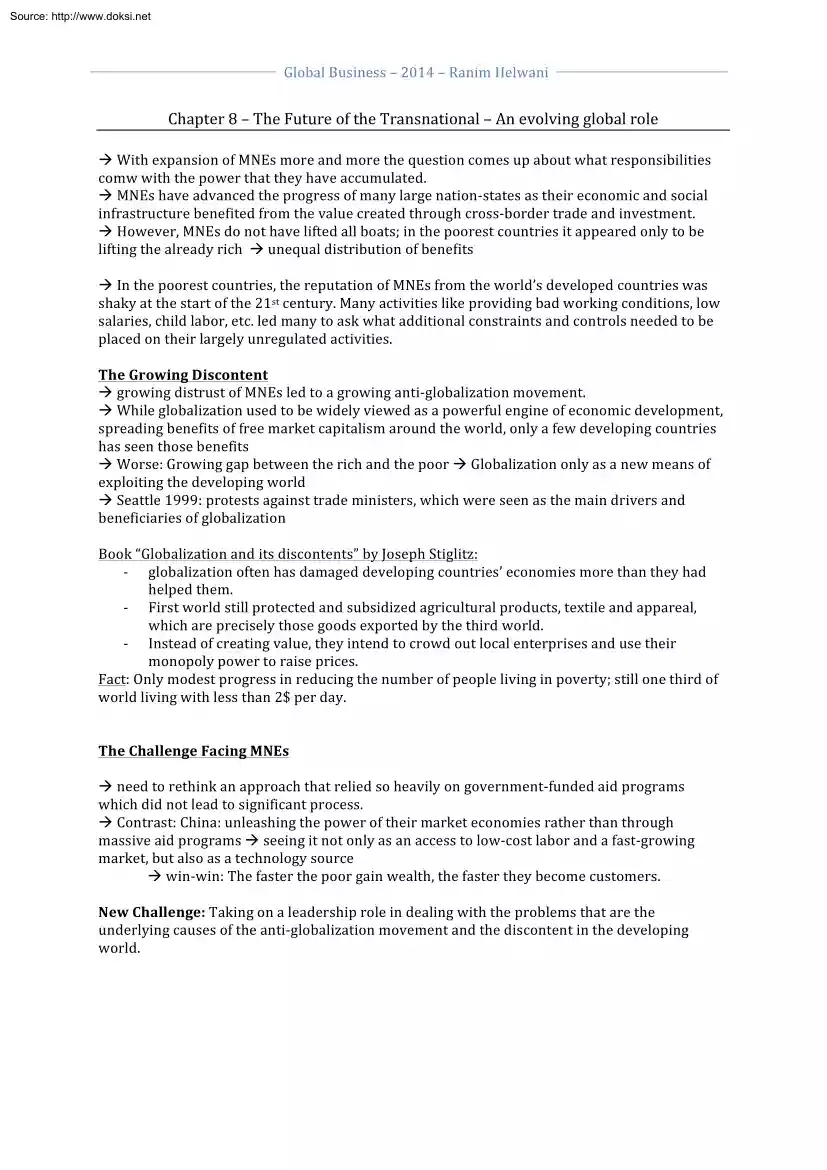
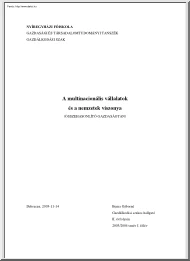
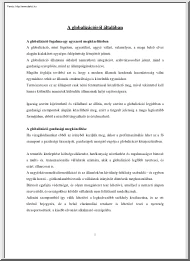
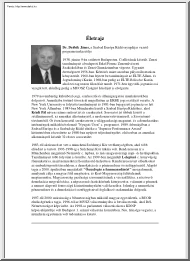
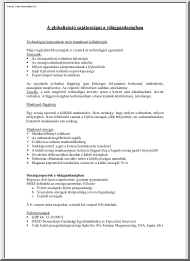
 When reading, most of us just let a story wash over us, getting lost in the world of the book rather than paying attention to the individual elements of the plot or writing. However, in English class, our teachers ask us to look at the mechanics of the writing.
When reading, most of us just let a story wash over us, getting lost in the world of the book rather than paying attention to the individual elements of the plot or writing. However, in English class, our teachers ask us to look at the mechanics of the writing.